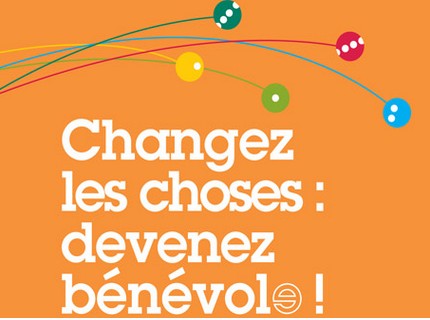The European Movement of Alpes-Maritimes, chaired by Brigitte Ferrari, supports the community program. In order to highlight these efforts and encourage more citizens to get involved, the European Commission today launched the European Year of Volunteering 2011. Ms. Viviane Reding, Vice-President and member of the Commission responsible for justice, fundamental rights, and citizenship, presented the year’s slogan: “Change things: become a volunteer!”
“If we truly want to make the world better and safer, we need volunteers more than ever,” said Mr. Kofi Annan. It is in this spirit that one hundred million Europeans dedicate their free time and skills to helping people in need and supporting their community: it could be a retired art teacher giving lectures on European masterpieces to foreign museum visitors, a high school student reading to hospitalized children, or a former national team soccer player coaching neighborhood club players. There are thousands of ways to change things. “I want to pay tribute to the millions of Europeans who take the time to make our world a better place,” declared Ms. Viviane Reding, Commission member responsible for justice, fundamental rights, and citizenship. “We all have the capacity within us to help those in need. Volunteering strengthens our core European values: solidarity and social cohesion. As we kick off the European Year of Volunteering, I want to support those who strive to make a difference. It is time for us to share and give back, that is, to help those who help!”
According to a Eurobarometer survey from May 2010, three in ten Europeans engage in volunteer activities. There are many different definitions and traditions related to volunteering. The common point of these activities is that every time people come together to help each other or help others in need, it benefits both society as a whole and the volunteers themselves. Volunteering allows for the acquisition of knowledge, the use of one’s skills, and the expansion of one’s social network, which can often lead to new or better job prospects and foster personal and social development.
The Commission helps young people participate in volunteer activities. Under the European Voluntary Service, thousands of teenagers and young adults go abroad to teach, raise cultural awareness, and acquire vital personal and social skills. For example, volunteers at a Copenhagen home called “Verahus” assist people with disabilities in their daily lives. They offer them various activities, such as painting, music, games, and sports, and accompany them on excursions.
To highlight the work of volunteers, inspire vocations, and address the challenges they face, the European Year of Volunteering 2011 pursues four objectives:
• Reduce barriers to volunteering in the EU;
• Empower volunteer organizations and improve the quality of volunteering;
• Recognize and reward volunteer activities;
• Raise awareness of the value and importance of volunteering.
To achieve these objectives, the Commission will encourage the exchange of good practices between Member States’ authorities and volunteer organizations. The focus will be on volunteer training, accreditation, and quality assurance, with an efficient and effective match between potential volunteers and volunteering opportunities. The Commission will support new initiatives to establish networks at the European level to stimulate cross-border exchanges and synergies between volunteer organizations and other actors, including businesses.
Throughout the Year of Volunteering, hundreds of activities and projects will be highlighted and supported, including at the European level:
• The Tour: volunteers will travel through the Member States for a year. At each stage, they will present their activities and meet with policymakers and the general public;
• The Journalist Relay: twenty-seven volunteer journalists will follow the activities of fifty-four volunteer organizations. They will produce a series of articles and video and audio clips that will be published and broadcast in the media. At the end of the year, the various reports will be compiled to produce a documentary, intended for distribution, on the European Year of Volunteering and the Tour;
• Four thematic conferences will be organized in 2011 to highlight essential aspects of volunteering: on January 8 in Budapest: Recognition of Volunteering; in May/June: Honoring Volunteers and their Work; in October: Empowering Volunteer Organizations; and in December: Closing Conference on Future Challenges.
The Commission is currently working closely with the “Alliance” of volunteer organizations, the European Parliament, the Member States, the Committee of the Regions, the European Economic and Social Committee, the Council of Europe, and the United Nations Volunteers.


